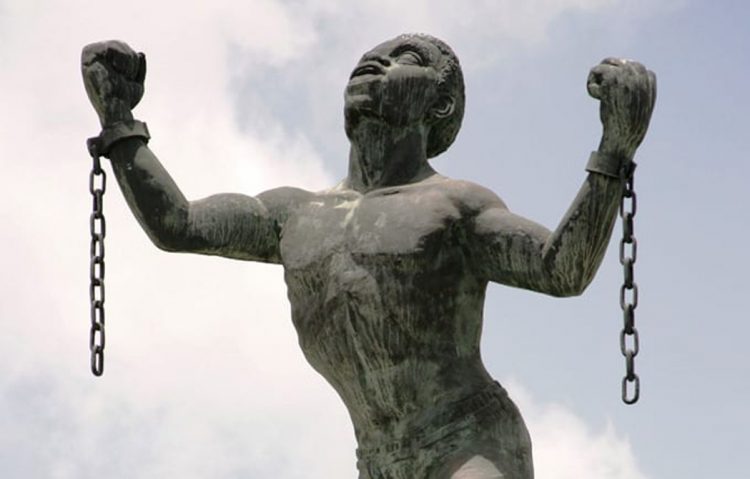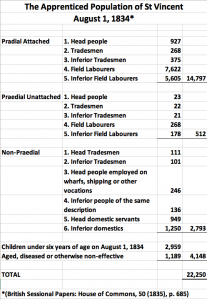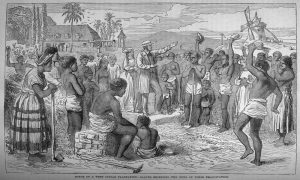Emancipation Day in St Vincent – A look back to August 1, 1838

Enslaved people on the island of St Vincent received “full emancipation” on August 1, 1838, four years after they had received “partial freedom” with the passing of the Abolition Act in 1833.
The motion for the abolition of slavery was introduced into the British House of Commons in 1833.
The passage of that motion gave partial freedom to enslaved people in the British Empire on August 1, 1834. They were, however, to be subjected to a period of apprenticeship before the granting of full freedom.
For a number of reasons, the apprenticeship itself had to be abandoned and full emancipation granted on August 1, 1838.
Emancipation Day in St Vincent
Extracts from the address of His Excellency, Lt. Governor Tyler to the Apprenticed Labourers of St Vincent on August 1, 1838, the date of the achievement of ‘full emancipation’.
“By the provisions of this Act, after the first of August, your Masters cannot lawfully turn you away from the Estate for one year, if you are willing to work for that year, for fair and reasonable wages.
“On the other hand, if he wishes you to remain, and you are unwilling he cannot oblige you; but remember the land you cultivate, and the houses you occupy are his, and not yours, and if you will not labour for him, you cannot expect to be allowed to remain on his property.
“The law likewise obliges the Proprietors of Estates to take care of the old and the infirm for that year, or until proper provision is made for them; it also give you time, as well as your Masters, to make arrangements for the future. There is no Law to fix the price of labour or rate of wages between you; but recollect, when a man pays money for labour, he will only employ those who will work diligently and cheerfully…
“When Servants leave their employment they will be entitled to receive from their employer a written character of conduct; every Master who refuses to give a Servant a character is liable to a fine of Five Pounds…
“Any Master giving a false character will be punished. This is done that the good and well disposed may be known and encouraged. The hours of labour are fixed by this Law (Law for “regulating and determining disputes between Masters and Servants) for Estates work, namely, from six o’clock in the morning to six at night.
“The labourer must be at his work at six in the morning, – he is allowed one hour for breakfast and two hours for dinner; if a labourer absents himself from his work, without a reasonable cause, to be allowed by a Magistrate, he will be liable to lose four dogs (or six pence) for every hour absent; and should any Servant employed, depart without leave, and not return, the Master will apply to a Magistrate, who is authorized by the Law to adjudge imprisonment to hard labour for such wilful breach of contract.
“All contracts for wages to be made payable in the current coin of the country. – Complaints against employers for non payment of wages, or non-performance of contract to be settled by an Justice of the Peace. – Servants employed may bargain with their Masters for clothing, salt-fish, and medical attendance…

“…The 1st of August next will be a great and glorious day: a day upon which your masters have made you all as free as themselves; – a day which forever banishes all traces of slavery and bondage from this Colony; a day therefore that should be celebrated, – not by rioting or drunkenness, – but by solemn thanksgiving to God for his merciful great kindness in ordaining such a blessing to his creatures inhabiting this happy and favoured Island; every Church and Chapel in the Colony will be opened on that day; make it your duty therefore to attend some place of divine worship and there humbly thank God for all the mercies and blessing conferred upon you…”
What was the atmosphere like in St Vincent on August 1, 1838?
Extract from the Diary of John Colthurst, Stipendiary Magistrate of the Leeward District, stationed in Barrouallie – August 1, 1838, 11:30 p.m.
“…As the police magistrate of the district, I was present all day in the town of Barrouallie, inspected the police and issued such orders as I considered necessary in case of any ebullition of popular feeling. All, however, was in order and, I must add, solemn tranquility even far beyond anything I had reason to expect from the uniform good conduct of the apprentices of the entire district since I became their Special Magistrate.
“I attended service at the Protestant church which was crowded to excess with now, thank Heaven, a free people, and I do not recollect any circumstance during a long life which so deeply interested me as being present on this eventful day, among the hundreds of the liberated about me, and with them… The solemnity upon this occasion was profound, and the responses made by an evidently absorbed people who, for the first time in their lives, sat in the House of God free from the better reflection that although he permitted them to address him, yet those addresses and supplications were hitherto those of slaves;
“… The service throughout was appropriate, and the sermon preached by the Rev. Mr. Brathwaite extremely to the purpose. It embraced the captivity of the Hews by the Egyptians, how they became the chosen people of God etc. etc., how they rebelled against him, and the consequences. He compared the slavery of the Africans in the West Indies with the captivity of the Jews with the great difference in the period of its continuance, etc., etc., and finally explained to his hearers their duties to god, their Queen, their Country and to each other, and terminated his discourse pathetically and solemnly, so much so that few dry eyes were found in the church, my own among the many…

“The day has passed away in the most profound tranquility, and extraordinary to say, there was not a single revel or absolute merrymaking in the town or neighbourhood. Shaking of hands, visiting between services, and congratulations with tea, cakes and spiced bread seemed to be the order of the day.
“This respectable conduct amongst the negroes upon so exciting an occasion is mainly attributed to the unwearied exertions of the Rev. Mr. Brathwaite and the Rev. Mr. Marsden, the Wesleyan missionary, who have been on this particular occasion, as well as every other, unremitting in the discharge of their duty; and truly their success is quite astonishing, shewing… the susceptibility of these poor people to proper training. It is a remark and, I think, a just one that whenever a people are found grossly ignorant and superstitious, as the negroes were a few years ago, truth once inculcated and firmly planted shoots away vigourously, provided the soil is what it aught to be…
“It may be easily supposed how anxious I have been for the last 4 or 5 weeks in anticipation of the first of August, and the probable conduct of the negroes on that eventful day; but it has passed over gloriously. All is joy and thankfulness, and order. I shall now retire to bed and sleep, if I can, with a mind relieved…”











